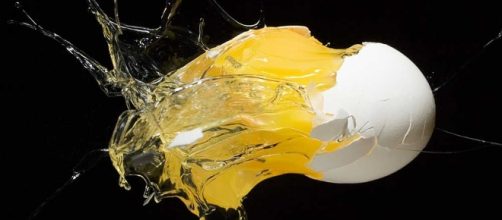While the rest of the world was absorbed with whatever else was happening in 2015 (I can't remember, can you?), and while I was bumbling away in my final undergraduate year at Flinders University, logic was being defied and scientific history made but a few hundred metres up the hill from me in the science department.
I'm telling you this now, in 2017, because no one seems to know that it happened, and that's just ridiculous. They unboiled an egg, for goodness sake! This is the stuff that 60s sci-fi dreams were made of!
So I'm here to bring the world up to date.
We may not have affordable hoverboards with power steering, but we do have a device that can unravel proteins and thus return a hard-boiled egg to its previous liquid state.
The Discovery
Flashback to 2015, when Professor Colin Raston led a team of Australian and US Scientists in the invention of the Vortex Fluid Device, or VFD. To prove its effectiveness, they successfully used the VFD to unravel the tangled proteins of a boiled egg by lubricating them with urea (yes, the same stuff that's in your pee) and spinning them around in a crazy-fast vortex. The cooking process was reversed as the proteins resumed their original (or 'native') shapes. The invention won Professor Raston the coveted Ig Nobel Prize, which celebrates improbable research with important implications.
Conveniently, in the intervening years, TED-Ed has made a handy video explaining in clear, gorgeously-animated terms precisely how the VFD works, and why it is such an important discovery. So if you like moving pictures better than static words, this is my gift to you:
If you like words, on the other hand, here are some more:
The Implications
You may have missed it earlier, but the Ig Nobel Prize requires research to be properly used, and the VFD certainly is. Proteins are the building blocks of life, don't you know? One of their more modern applications is in cancer medications, such as this salmonella-based treatment. However, in creating such medications, many proteins fold into very problematic shapes - they become tangled in the same process that results in a boiled egg.
But if you're trying to produce an easily-processed batch of proteins rather than a nutritious breakfast, this is a major issue. If used to detangle proteins for cancer medications or other pharmaceutical products, the VFD could dramatically reduce the time and energy required for their production, not to mention the amount of waste generated in the process. Ultimately, this equates to huge advances in the medical industry that could pave the way for cheaper and more effective protein-based treatments across the board.
Professor Raston also believes that his invention could have huge implications for the biofuel and food industries. In fact, he has already demonstrated how the VFD can be used to dramatically increase the efficiency of biodiesel production.
The future is here. And a single invention can jump straight from culinary wizardry to cancer treatment.


